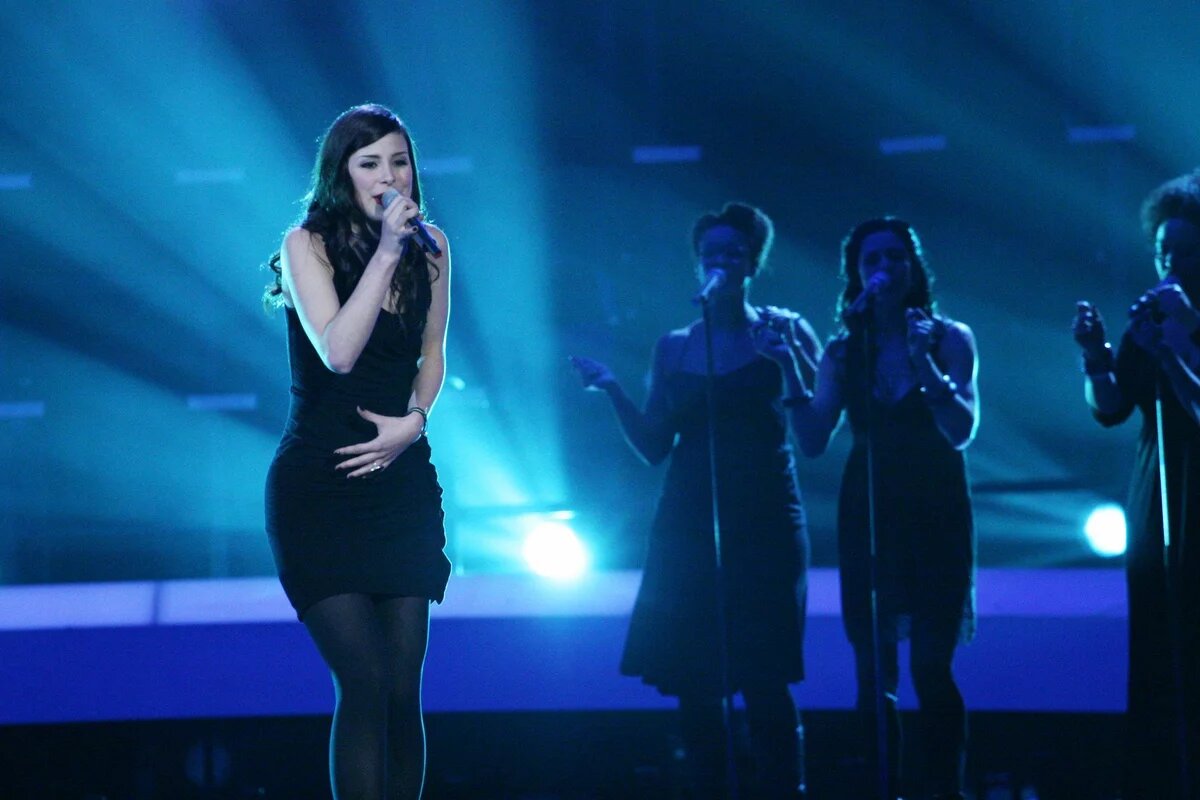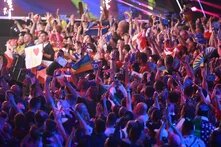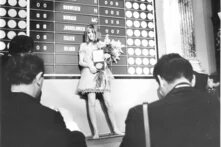The Europeanization of German identity runs like a red thread through Germany's post-war history and is also evident in its performances at the ESC: Germany presents itself as cosmopolitan.

The ESC provides a constantly changing window onto national identity in Europe through the prism of popular music and television entertainment. For countries such as Germany with a troubled history of aggression, occupation and war, the song contest can offer a powerful symbolic means of making amends for histories of violence, providing myriad possibilities for atonement. Countries can for example harness the medium of song to counteract negative perceptions and stereotypes amongst their European neighbours and use the contest to manage their public image and brand. A good example of this is the way Germany has reinvented itself on the Eurovision stage after the defeat of National Socialism.
Since World War II Germany has fashioned itself as a reformed, peaceful nation, but also as a country that is a reliable neighbour, a good citizen and above all a ‘good European.’ The Europeanization of German identity runs as a red thread throughout postwar German history. Germany’s route to mastering its Nazi past through European integration was memorably captured by exiled writer and national icon Thomas Mann in 1953 when he told students in Hamburg to strive “not [for] a German Europe but a European Germany.”. The vision of a European Germany has become a consensus of the political elites and it can be seen in international politics, in support for European integration, as well as in Germany’s cultural diplomacy. German engagement with the ESC offers an especially good vantage point from whence to examine the interplay between national and European identity-formation.
West Germany participated in the Eurovision Song Contest until reunification when the five East German states also joined the competition. Germany’s participation in the song contest is part of the history of West Germany’s commitment to Western European integration. After the war successive West German governments embraced European integration along the lines of a “United States of Europe”. There is a school of political thought that believes that the political culture of a nation can be measured in terms of the strength of its institutions, and that Germany’s postwar political and economic institutions are the source of the country’s prosperity. West Germany’s political institutions are generally considered to be stable, and its integration into European and international alliances such as the EU and NATO strong. Germany, for instance, was happy to sacrifice its sovereignty in the forty years after WWII and to atone for its past crimes by becoming European. Germans are for this reason often described as having a “post-national identity,” or of having national pride in their constitution and stable currency, in a “Deutschmark Nationalism,” as Jürgen Habermas once remarked.
Risse and Engelmann-Martin have argued that to be “a ‘good German’ means nowadays to be a ‘good European’ and to wholeheartedly support European integration”.
German Cosmopolitanism at the ESC
Germany has participated in Eurovision since the outset, and has missed only one year in 1996 when it failed to qualify. It was one of the six participating countries in the first Eurovision contest held in Lugano in Switzerland in 1956. At first glance, there is nothing special or out of the ordinary about the acts that Germany has sent to the competition since that time. On closer analysis, however, we find that German entries do not seem especially German, neither in the fifties nor in the twentieth first century. In fact, they are noteworthy for their distinct lack of Germanness. Possibly more than any other nation Germany sends songs and artists that do not use overt national and regional symbols, codes or signifiers.
German songs are often distinguished by particular themes: peace and contrition, both of which accord with Germany’s approach to ‘Vergangenheitsbewältigung,’ and the image of a Europeanized Germany. Since the introduction of the free language rule in 1999, German entries have almost always been sung in English. In fact, since 2008 all German entries have been sung in English. But this lack of Germanness is not only apparent in the choice of language; it is also behind the choice of singers, musical style and costumes.
A striking feature of Germany’s entries is the cosmopolitanism of the competitors who are selected to represent the country.
Many countries choose non-national singers but Germany has a particularly strong track record in sending either non-nationals, or nationals with non-Germanic-sounding names. The ESC can be a good forum for celebrating cosmopolitanism despite the fact that it is essentially a national contest. Historically, the cosmopolitan flavour of German entries is a reflection of the Americanization of German popular music more generally. After the war West Germany embraced American music styles such as jazz, swing and boogie woogie with gusto. Jazz in particular was painted as a moderating force, which, as Andrew W. Hurley has discovered, progressive Germans embraced as part of the project of “liberalizing German society.”
It was in this spirit that in 1956 Germany sent the country singer Freddy Quinn with the rock’n’roll song “So geht das jede Nacht”, and Walter Andreas Schwarz with a slow ballad “Im Wartesaal zum großen Glück”. Freddy Quinn was Austrian with an Irish father, and had spent some years of his youth in Virginia. He spoke fluent English and German. He performed to American GIs and on American radio in Germany, before being discovered by a German record label in the mid-fifties. In the sixties Germany sent three artists who were not born in Germany, in 1964 the Bulgarian-born Nora Nova, in 1968 the Norwegian Wencke Myhre, and in 1969 the Swedish singer Siw Malmkvist. In the seventies, Germany selected in 1973 Gitte (Gitte Haenning), who was born in Denmark. In 1976 it chose the Les Humphreys Singers, who were born in various countries, including England, and in 1977 it selected Silver Convention, a trio of singers from Munich, who were born in Germany, Austria and the US. This pattern continued in 1978 with the selection of the British-German singer Ireen Sheer, and in 1979 with several of the band members of Dschinghis Khan being born outside Germany. In the eighties the trend continued with the Lithuanian singer Lena Valaitis in 1981, and Nino de Angelo, of Italian descent, performing in 1989. In the 2006, Germany even sent an Australian singer, Jane Comerford, and her German band Texas Lightning and in 2014 the Ukrainian singer Elaiza. In 2022 Germany sent Malik Harris, the German-born son of Ricky Harris, a Black American television personality and musician.
Germany’s choice of non-German performers to send to Eurovision is a product of the broader international thrust of West Germany’s popular music industry. The selection of representatives for Eurovision was not necessarily a conscious decision to avoid nationals or to prioritize non-nationals but simply the result of changing German tastes in popular music and the postwar music industry more generally. The postwar German music market was heavily dominated by international stars, such as Dalida (a French-Italian singer, who recorded German versions of French chansons), Vico Torriani (a Swiss Schlager singer), Gus Backus (an American German Schlager singer), Roberto Blanco (born in Tunisia but of Afro-Cuban background), Roy Black (a German Schlager singer but with a US sounding name, who was dubbed the German Roy Orbison). There were also international stars who made German-language versions of their hits such as the American Connie Francis and the Greek Nana Mouskouri.
In the fifties and sixties German popular music was dominated by a German-inflected brand of pop song, the Schlager, just as in France popular music was oriented towards the chanson and in Italy the canzoni. The Schlager was in fact a porous, flexible genre of commercial music that absorbed and adapted international influences. German Schlager music was cosmopolitan in feel and hybrid in style. Singing German Schlager songs with a foreign accent was popular not only in Germany but also elsewhere in Europe. Moreover, it was a perfect medium for facilitating the transfer of musical styles across the Atlantic. From around 1953 to the mid-sixties German language songs topped the charts in Germany, and Freddy Quinn was the most popular singer.
In 1959 Germany sent the hugely popular Alice and Ellen Kessler to the ESC. The Kessler twins were German-born but styled themselves on American swing singers. Their song “Heute Abend wollen wir tanzen geh’n,” which is sung in German, features the cheeky opening line “Hello boy,” sung with the slightest hint of an American accent. In 1962, the teenage star Conny Froboess was selected with the song “Zwei kleine Italiener,” a fun pop song which referenced Italian guest workers.
Musical Style and zeitgeist
In the early years of the contest, German entries varied in musical style. In 1957 and 1960 the songs chosen had a distinct transcultural flavour, with a smattering of other languages (English, French, Italian) mixed in with the German. Eurovision songs also drew on the older wartime Schlager tradition of Zarah Leander—a Swedish singer and actress popular in Nazi Germany--and her 1942 international hit “Ich weiß, es wird einmal ein Wunder geschehen.” In addition to the idioms of wartime Schlager, some of Germany’s early entries, such as Lale Andersen’s “Einmal sehen wir uns wieder” from 1961, drew on the traditions of the more ‘serious’ and musically complex strain of German popular music from 1930s theatre and musicals such as Brecht/Weill’s Dreigroschenoper Opera.
Throughout the sixties German Eurovision entries captured much of the zeitgeist of international popular music, with some displaying a Brit-pop feel, such as in Inge Brück’s 1967 song “Anouschka”. In the 70s and 80s, German entries alternated between Schlager, and entries that followed international trends, incorporating elements of disco, folk rock, Californian rock, and even rap. In 1970 and 1971, for instance, Katja Ebstein sang songs in hybrid contemporary styles that blended elements of jazz, soul and blues as well as soft rock and folk rock. As the Schlager established itself as a distinct type of pop music, it gradually acquired German associations and inevitably invoked a certain amount of German pride. To counteract the dominance of British pop and American music, the German television station ZDF launched its show Hitparade with Dieter Thomas Heck. But though Schlager established itself as a well-known German variation of the pop song, entries in ESC never deployed traditional (southern) German symbols such as the Alps, beer halls, lederhosen, dirndls, yodelling, or used one of the many regional dialects. This is all the more surprising given that the ESC has come to thrive on national stereotypes.
Germany’s participation in the ESC in the 70s and 80s is unthinkable without the influence of songwriter and producer Ralph Siegel. Siegel has been a key factor in Germany’s success. He understood the challenges for Germany of elevating a song’s national message to the international level and the importance of using codes that would speak to the rest of Europe.
Femininity as Road to Success
Germany’s judicious avoidance of expressions of Germanness cannot per se be considered a winning formula but at crucial times this approach has resonated strongly with the rest of Europe. In particular in 1982 and 2010 this contributed to a climate conducive for a German win. In these two wins Germany projected the image of a peaceful, reformed and contrite power. Both arguably reflected Germany’s identity as a democratic Europeanized country.
In the first three decades of Eurovision Germany was statistically far more likely to win choosing a single female performer. In 1982 Siegel chose Nicole, and a theme that was not only extraordinarily topical but also a source of high anxiety for Europeans: the threat of war. Against the backdrop of the Cold War nuclear arms race, Siegel’s composition titled “Ein bißchen Frieden” a simple folk song about peace, had instant appeal. Coming six months after peace demonstrations across Western Europe calling for an end to the Euromissile crisis, Nicole’s song could hardly have come at a more opportune time. It was not an angry plea to withdraw NATO troops from German soil, a nationalistic cry for sovereignty or even a patriotic call for German unification; Nicole was not even a peace activist, just an ordinary young girl with normal hopes and aspirations. A feminine performer representing a formerly aggressive world power helped to soften Germany’s public image. Germany appeared in the look and sound of Nicole’s performance as a tamed and chastened defeated power, a country who was simply begging not to be sacrificed in a new war.
Germany was successful again in 2010, interestingly, soon after it had hosted the FIFA World Cup. The performer and song chosen by Stefan Raab captured the mood of “partyotism”, a fun kind of national pride that had been manifest during the World Cup. The choice of singer, 18-year old Lena Meyer-Landrut, who had not even finished school, proved a stroke of genius. Lena was refreshingly unpretentious and natural, and Raab’s song “Satellite” about being a teenager in love was catchy. Lena spoke English with a Cockney inflection that at times sounded slightly New Zealand or Australian. Her slightly goofy dancing set her apart from more polished contestants. What also assisted the 2010 victory was Germany’s role in the 2008 Global Financial Crisis in the Eurozone. With news of the German parliament’s decision to bail out struggling countries in the Eurozone fresh in people’s minds, voters and juries were both positively disposed towards Germany. Germany scored especially well with those countries most affected by the GFC. Germany’s self-presentation in 2010 was, as in 1982, commensurate with being a good European, and its self-perception as Europeanized. Raab’s idea to scale back the glitz and glamour of Lena’s act, and again to avoid signifiers of Germanness, paid dividends and captured well the emerging mood of austerity.
Sadly, the positive attitudes to Germany did not last, and in 2015, 2016 and 2017, when it came 27th, 26th and 25th respectively, Germany was no longer the ‘good European’ but frequently cast as the tough taskmaster of Europe. While Germany’s luck changed in 2018 with Michael Schulte’s song “You let me walk alone” which came fourth, the 2020s have seen Germany at the bottom of the scoring board again. Germany continues to send songs that are sung in English despite the latest trend of returning to national languages. It follows the same recipe of sending modern, western-sounding, mostly commercial music, which does not highlight its Germanness.
Cultural Atonement
In conclusion, the cultural domain affords Germany, a country with a history of imperialism, occupation and violence, with a means of atoning for its Nazi past. The medium of song allows it to demonstrate a reformed image of the nation as a reliable democratic neighbour. In the history of the ESC Germany has consistently emphasized its Europeanness and downplayed its Germanness, a strategy it has not deviated from to date. The most successful German successful entries owe much to the country’s self-imagining as western, peace-loving, and as a responsible global citizen. Moreover, it appears to be most successful when it performs a non-threatening, fun-loving and female form of national identity. However, as a large power, Germany’s fortunes at Eurovision are, along with others such as the UK and France, more often than not mixed. We should not forget that ESC can equally serve as an uncomfortable barometer of Europe’s ambivalence towards and even frustrations with Germany in key areas of European culture and politics. For this reason, we should expect to continue to see fluctuations in the reception of its performances at Eurovision as European priorities change and new crises and challenges such as Russia’s war on Ukraine emerge across the region.
Prof. Dr. Alison Lewis teaches German Studies at the University of Melbourne. Her research focuses on post-war German culture and society.


